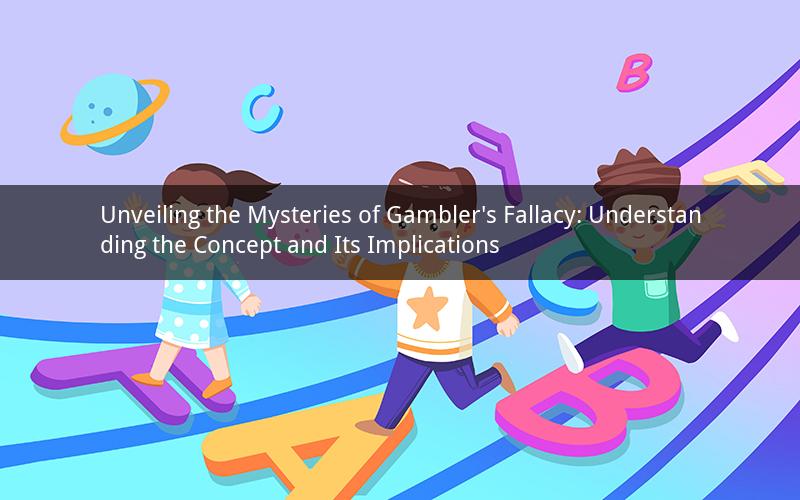
Gambler's fallacy, also known as the Monte Carlo fallacy, is a cognitive bias that affects the way people perceive random events. It occurs when individuals believe that a random event is more or less likely to occur based on previous outcomes. This fallacy is common among gamblers, but it can also affect people in various other contexts. In this article, we will delve into the concept of gambler's fallacy, explore its implications, and discuss ways to avoid falling victim to this cognitive bias.
Understanding Gambler's Fallacy
The gambler's fallacy is rooted in the misconception that past events can influence the outcome of future events, even when they are independent. For example, consider a coin toss. If the coin lands on heads five times in a row, a person suffering from the gambler's fallacy might believe that the next toss is more likely to result in tails, as if the coin is "due" for a tails outcome. However, the probability of the coin landing on heads or tails remains 50% for each toss, regardless of the previous outcomes.
Implications of Gambler's Fallacy
The gambler's fallacy can have several negative implications, both in gambling and in other areas of life. Here are some of the key consequences:
1. Poor Decision-Making: When individuals fall victim to the gambler's fallacy, they may make irrational decisions based on false beliefs about probability. This can lead to financial loss, poor health outcomes, and other negative consequences.
2. Increased Risk-Taking: People who believe in the gambler's fallacy may be more inclined to take risks, as they believe that they are "due" for a win after a series of losses. This can lead to increased gambling, investing, and other risky behaviors.
3. Misinterpretation of Data: The gambler's fallacy can also affect the way people interpret data. For example, a person might believe that a stock is "due" for a rise after a series of declines, even though the stock's performance is based on its fundamental value and market conditions.
4. Negative Impact on Sports Betting: The gambler's fallacy can lead to poor sports betting decisions. For instance, a person might believe that a team is "due" to win after a series of losses, even though the team's chances of winning are based on its current performance and the skill level of its players.
Ways to Avoid Gambler's Fallacy
To avoid falling victim to the gambler's fallacy, it is essential to understand the concept of probability and the independence of events. Here are some strategies that can help:
1. Educate Yourself: Learn about probability and the concept of independent events. Understanding these concepts can help you recognize when you are falling victim to the gambler's fallacy.
2. Set Limits: Set a budget for gambling or other risky activities, and stick to it. This can help you avoid making irrational decisions based on false beliefs about probability.
3. Seek Professional Advice: If you are struggling with gambling or other risky behaviors, consider seeking help from a professional. They can provide you with the tools and support you need to overcome the gambler's fallacy.
4. Stay Informed: Keep up with the latest research and information on probability and the gambler's fallacy. This can help you stay informed and make more rational decisions.
5. Practice Mindfulness: Mindfulness techniques, such as meditation and deep breathing, can help you stay focused and grounded, reducing the likelihood of falling victim to the gambler's fallacy.
Frequently Asked Questions
Q1: What is the difference between the gambler's fallacy and the law of large numbers?
A1: The gambler's fallacy is a cognitive bias that occurs when individuals believe that past events can influence future outcomes, even when they are independent. In contrast, the law of large numbers states that as the number of trials increases, the average outcome of a random event will converge to its expected value.
Q2: Can the gambler's fallacy be harmful in non-gambling situations?
A2: Yes, the gambler's fallacy can be harmful in non-gambling situations. For example, it can lead to poor decision-making, increased risk-taking, and misinterpretation of data.
Q3: How can I tell if I am suffering from the gambler's fallacy?
A3: If you find yourself making decisions based on false beliefs about probability, or if you believe that past events can influence future outcomes, you may be suffering from the gambler's fallacy.
Q4: Can the gambler's fallacy be cured?
A4: While the gambler's fallacy is a cognitive bias that can be challenging to overcome, it can be managed with education, self-awareness, and the adoption of strategies to avoid falling victim to this bias.
Q5: Is there a way to prevent the gambler's fallacy from affecting my decisions?
A5: Yes, by educating yourself about probability, setting limits, seeking professional advice when needed, staying informed, and practicing mindfulness, you can reduce the likelihood of falling victim to the gambler's fallacy and make more rational decisions.